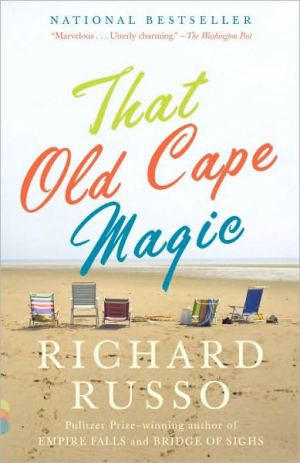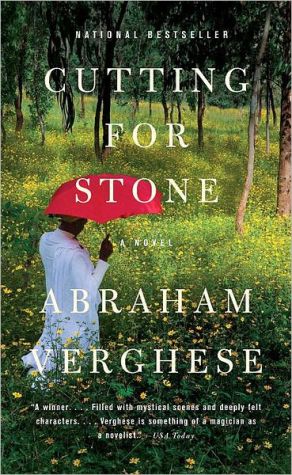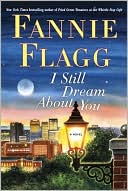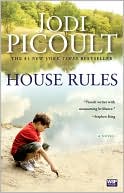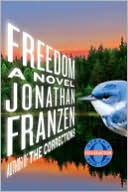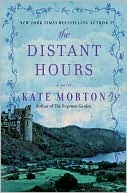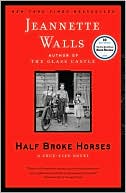That Old Cape Magic
For Griffin, all paths, all memories, converge at Cape Cod. The Cape is where he took his childhood summer vacations, where he and his wife, Joy, honeymooned, where they decided he’d leave his LA screenwriting job to become a college professor, and where they celebrated the marriage of their daughter Laura’s best friend. But when their beloved Laura’s wedding takes place a year later, Griffin is caught between chauffeuring his mother’s and father’s ashes in two urns and contending with...
Search in google:
Griffin has been tooling around for nearly a year with his father's ashes in the trunk, but his mother is still very much alive, and not shy about calling on his cell phone. She does so as he drives down to Cape Cod, where he and his wife, Joy, will celebrate the marriage of their daughter Laura's best friend. For Griffin this is akin to driving into the past, since he took his childhood summer vacations there, his parents' respite from the hated Midwest, and the Cape is where he and Joy honeymooned. But by the end of this perfectly lovely weekend, the past has so thoroughly swamped the present that the future suddenly hangs in the balance. And when, a year later, a far more important wedding takes place, their beloved Laura's, Griffin's chauffeuring two urns of ashes as he contends once more with Joy and her large, unruly family, and both he and she have brought dates along. How in the world could this have happened? From the Compact...The Barnes & Noble ReviewMiddle-aged disappointment is a tough sell. It's a subject that can easily fall into bitterness, dreariness, unattractive self-pity. And like everything else, it's probably easier to deal with on summer vacation. In That Old Cape Magic, Richard Russo takes on the novel of middle-aged reassessment, the marital breakup novel, the academic novel, and, what the hell, tosses in a bit of the Hollywood novel, as well. What's remarkable is that the thing holds up as well as it does. There are places where it could be funnier, places where Russo fails in the novelist's duty to go for the empathetic instead of the merely sharp surface observation. But he's a smooth and, when he's at his best, rueful writer. Reading That Old Cape Magic, you feel yourself sliding into the life changes Russo describes as easily as his protagonist, Jack Griffin.
I\ A Finer Place\ Though the digital clock on the bedside table in his hotel room read 5:17, Jack Griffin, suddenly wide awake, knew he wouldn’t be able to get back to sleep. He’d allowed himself to drift off too early the night before. On the heels of wakefulness came an unpleasant realization, that what he hadn’t wanted to admit yesterday, even to himself, was now all too clear in the solitary, predawn dark. He should have swallowed his petulance and waited the extra day for Joy.\ It had been their long- established habit to flee the campus as soon as Griffin taught his last class. Usually, they hopped on the Freedom Trail (his term for I- 95), drove to New York and treated themselves by checking into a good hotel. During the day he would evaluate his small mountain of student portfolios while Joy shopped or otherwise amused herself, and then, evenings, they’d catch up on movies and go to good restaurants. The whole thing reminded him of the early years of their marriage back in L.A. It cost a small fortune, but there was something about spending money they didn’t really have that made him optimistic about more coming in—which was how it had worked in L.A.—and it got him through the portfolios.\ This year Kelsey’s Cape Cod wedding had royally screwed up their plans, making New York impractical, though he’d been willing to substitute Boston. But Joy, assuming that thanks to the wedding all the usual bets were off, had messed things up further by scheduling meetings on the day after his last class. “Just go,” she said when he expressed his annoyance at the way things were working out. “Have a boys’ night out in Boston and I’ll meet you on the Cape.” He’d squinted at this proposal. Didn’t you need more than one to have a boys’ night out? Or had Joy meant it to be singular, one boy celebrating his boyness? Was that how she’d understood the phrase all her life, as singular? Joy’s relationship to the English language was not without glitches. She was forever mixing metaphors, claiming that something was “a tough line to hoe.” Row to hoe? Line to walk? Her sisters, Jane and June, were even worse,\ and when corrected all three would narrow their eyes dangerously and identically. If they’d had a family motto, it would have been You Know Perfectly Well What I Mean.\ In any event his wife’s suggestion that he go on without her had seemed less than sincere, which was why he decided to call her bluff. “All right,” he said, “that’s what I’ll do,” expecting her to say, Fine, if it means that much to you, I’ll reschedule the meetings. But she hadn’t said that, even when she saw him packing his bag, and so he’d discovered a truth that other men probably knew already— that once you’d packed a bag in front of a woman there was no possibility of unpacking, or of not going and taking the damn bag with you.\ Worse, Joy, who preferred to watch movies on DVD rather than in a theater, as they were meant to be seen, had given him a list of films he was forbidden to see without her, and of course these were the only ones worth seeing. He’d spent an hour looking through the restaurant guides provided by the hotel, but couldn’t decide on one, or even on what kind of food he wanted. Griffin had no trouble making these sorts of decisions when she was around, but for some reason, when he had only himself to please, he often couldn’t make up his mind. He told himself this was just the result of being married for thirty years, that part of the decision- making process was imagining what his wife would enjoy. Okay, but more and more he found himself stalled, in the middle of whatever room he happened to be standing in, and he realized that this had been, of course, his father’s classic pose. In the end Griffin had ordered room service and watched a crappy made- for- TV movie, the kind he and Tommy, his old partner, had been reduced to writing that last year or two in L.A. before he’d gotten his teaching gig and moved back East with Joy and their daughter, Laura. He’d fallen asleep before the first commercial, confident he could predict not only the movie’s outcome but also half its dialogue.\ In order not to dwell on yesterday’s mistakes, he decided to put today in motion by calling down to the bell captain for his car. Twenty minutes later, dressed and showered, he’d checked out of his Back Bay hotel. The whole of Boston fit neatly into the rectangle of his rearview mirror, and by the time the Sagamore Bridge, one of two that spanned the Cape Cod Canal, hove into view, the sky was silver in the east, and he felt the last remnants of yesterday’s prevarications begin to lift like the patchy fog he’d been in and out of since leaving the city. The Sagamore arched dramatically upward in the middle, helping to pull the sun over the horizon, and though the air was far too cool, Griffin pulled off onto the shoulder of the road and put the convertible’s top down, feeling truly off the reservation for the first time since leaving home in Connecticut. There was something vaguely thrilling about not being where his wife thought he was. She liked to know what people were up to, and not just him. She called Laura most mornings, her brain still lazy with sleep, to ask “So . . . what’s on the agenda for you today?” She also phoned both of her sisters several times a week and knew that June was having her hair done tomorrow morning and that Jane had put on five new pounds and was starting a diet. She even knew what new folly her idiot twin brothers, Jared and Jason, were engaged in. To Griffin, an only child, such behavior was well over the line that separated the merely inexplicable from the truly perverse.\ Zipping along Route 6, Griffin realized he was humming “That Old Black Magic,” the song his parents had sung ironically—both university English professors, that’s how they did most things— every time they crossed the Sagamore, substituting Cape for black. When he was growing up, they’d spent part of every summer on the Cape. He could always tell what kind of year it had been, moneywise, by when and where they stayed. One particularly prosperous year they’d rented a small house in Chatham for the month of August. Another year, when faculty salaries were frozen, all they could afford was Sandwich in June. His parents had been less wed to each other than to a shared sense of grievance over being exiled eleven months of every year to the “Mid- fucking- west,” a phrase they didn’t say so much as spit. They had good academic careers, though perhaps not the stellar ones that might have been predicted, given their Ivy League pedigree. Both had grown up in the Rust Belt of western New York State, his mother in suburban Rochester, his father in Buffalo, the children of lower- middle- class, white- collar parents. At Cornell, where they’d both gone on scholarship, they’d met not only each other but also the kind of friends who’d invited them home for holidays in Wellesley and Westchester and for summer vacations in the Hamptons or on the Cape. They told their parents they could earn more money there, which was true, but in fact they’d have done anything to avoid returning to their parents’ depressing upstate homes. At Yale, where they did their graduate work, they came to believe they were destined for research positions at one of the other Ivys, at least until the market for academics headed south and they had to take what they could get—the pickings even slimmer for a couple—and that turned out to be a huge state university in Indiana.\ Betrayed. That was how they felt. Why go to Cornell, to Yale, if Indiana was your reward? But they’d had little choice but to hunker down and make the best of their wretched timing, so they dove into teaching and research and committee work, hoping to bolster their vitae so that when the academic winds changed they’d be ready. They feared the Princeton and Dartmouth ships had probably sailed for good, but that still left the Swarthmores and Vassars of the world as safe if not terribly exciting havens. This much, at least, was surely their due. And before going up for promotion and tenure (or “promotion and tether,” in their parlance) in the Midfucking-west, they’d each had opportunities—she at Amherst, he at Bowdoin—but never together. So they stayed put in their jobs and their marriage, each terrified, Griffin now suspected, that the other, unshackled, would succeed and escape to the kind of academic post (an endowed chair!) that would complete the misery of the one left behind. To make their unhappy circumstances more tolerable, they had affairs and pretended to be deeply wounded when these came to light. His father had been a genuine serial adulterer, whereas his mother simply refused to lag behind in this or anything else.\ Of course all of this was adult understanding. As a boy, the reluctant witness to his parents’ myriad quarrels and recriminations, Griffin had imagined that he must be the one keeping them together. It was his mother who eventually disabused him of this bizarre notion. At his and Joy’s wedding reception, actually. But by then they had finally divorced—even spite, apparently, was not eternal—and she’d narrowly won the race to remarry. In an ecumenical mood, she ventured outside the English department for her second husband, a philosopher named Bart, whom she’d quickly dubbed “Bartleby.” At the reception, half in her cups, she’d assured Griffin, “Good heavens, no, it wasn’t you. What kept us together was ‘That Old Cape Magic.’ Remember how we used to sing it every year on the Sagamore?” She then turned to Bartleby. “One glorious month, each summer,” she explained. “Sun. Sand. Water. Gin. Followed by eleven months of misery.” Then back to Griffin. “But that’s about par for most marriages, I think you’ll find.” The I think you’ll find, he understood, was of course meant to suggest that in her view, his own marital arithmetic was likely to be much the same. For a moment it seemed as if Bartleby might offer an observation of his own, but he apparently preferred not to, though he did sigh meaningfully.\ Griffin was about to respond when his father reappeared with Claudia, his former graduate student and new wife. They’d disappeared briefly after the ceremony, to quarrel or make love, he had no idea. “I swear to God,” his mother said, “if he buys that child a house on the Cape—and I do mean anywhere on the Cape—I may have to murder him.” Her face brightened at a pleasant thought. “You might actually prove useful,” she told Bartleby, then turned back to Griffin. “Your stepfather collects locked- room murder mysteries. Death by curare, that sort of thing. You can figure something out, can’t you? Just make sure I’m in full view of everyone in the drawing room when the fat cow hits the deck, writhing in excruciating pain.” She knew perfectly well, of course, that Griffin’s father didn’t have the money to buy Claudia (who was more zaftig than fat) or anyone else a house on the Cape, of course. She’d made sure of that by beggaring him in the divorce settlement, but the possibility— what of, that he might purchase a winning Lotto ticket?—still clearly worried her.\ To Griffin, now fifty- five, roughly the same age his parents had been when he and Joy married, the Cape place- names were still magical: Falmouth, Woods Hole, Barnstable, Dennis, Orleans, Harwich. They made a boy of him again and put him in the backseat of his parents’ car, where he’d spent much of his boyhood, unbelted, resting his arms on the front seat, trying to hear what they, who never made any attempt to include him in their conversations, were talking about. It wasn’t so much that he was interested in their front- seat conversations as aware that decisions that impacted him were being made up there, and if privy to these hatching plans he might offer an opinion. Unfortunately, the fact that his chin was resting on the seat back seemed to preclude this. Most of what he overheard wasn’t really worth the effort anyway. “Wellfleet,” his mother might say, studying the road atlas. “Why haven’t we ever tried Wellfleet?” By the time Griffin was a high school freshman, which marked the last of their Cape vacations, they’d rented just about everywhere. Each summer, when they handed over the keys at the end of their stay, the rental agent always asked if they wanted to book it for next year, but they always said no, which made Griffin wonder if the perfect spot they were searching for really existed. Perhaps, he concluded, just looking was sufficient in and of itself.\ While he roamed the beach unattended, full of youthful energy and freedom, his parents spent sunny afternoons lying on the sand with their “guilty pleasures,” books they’d have been embarrassed to admit to their colleagues they’d ever heard of. They were on vacation, they claimed, not just from the Mid- fucking- west but also from the literary canon they’d sworn to uphold. His mother’s taste ran to dark, disturbing thrillers and cynical spy novels. “That,” she would say, turning the book’s last page with evident satisfaction, “was truly twisted.” His father alternated between literary pornography and P. G. Wodehouse, enjoying both thoroughly, as if Naked Lunch and Bertie Wooster Sees It Through were intended as companion pieces.\ The only thing they both read—indeed, studied as intently as each year’s Modern Language Association job listings—was the real- estate guide. Unwilling to give the other a first look, they always picked up two copies as soon as they arrived and wrote their names on the covers so they’d know which was which and whose fault it was if one got lost. A house here was part of their longrange, two- part plan to escape the Mid- fucking- west. First they would find real jobs back East, where they’d locate a suitable apartment to rent. This would allow them to save money for a house on the Cape, where they’d spend summers and holidays and the occasional long weekend, until of course they retired—early if they could swing it—and lived on there full- time, reading and writing op- eds and, who knew, maybe even trying their hand at a novel.\ A single day was usually all it took for each of them to plow through the hundreds of listings in the fat real- estate guide and place each into one of two categories—Can’t Afford It or Wouldn’t Have It As a Gift—before tossing the booklet aside in disgust, because everything was more expensive this year than last. But the very next day his father would set Jeeves aside and take another look. “Page twenty- seven,” he’d say, and Griffin’s mother would set down her Ripley and rummage for her copy in the beach bag. “Bear with me, now,” he’d continue. Or, “Some things would have to go right”—meaning a big merit raise or a new university- press book contract—“but . . .” And then he’d explain why a couple of the listings they’d quickly dismissed the day before just maybe could be made to work. Later in the month, on a rainy day, they’d go so far as to look at a house or two at the low end of the Can’t Afford It category, but the realtors always intuited at a glance that Griffin’s parents were just tire kickers. The house they wanted was located in a future only they could see. For people who dealt largely in dreams, his father was fond of observing, realtors were a surprisingly unromantic bunch, like card counters in a Vegas casino.\ The drive back to the Mid- fucking- west was always brutal, his parents barely speaking to each other, as if suddenly recalling last year’s infidelities, or maybe contemplating whom they’d settle for this year. Sex, if you went by Griffin’s parents, definitely took a backseat to real estate on the passion gauge.
\ From Barnes & NobleThirty years ago on their Cape Cod honeymoon, Griffin and Joy half-playfully drafted "the Great Truro Accord," their domestic equivalent of the Mayflower Compact. In the decades since, they had achieved the goals they had so ambitiously enumerated. Now, returning to that scene, they attend the wedding of their daughter's best friend, little knowing that their New England getaway will change both their lives in most unexpected ways. A supple novel about middle-aged relationships at the cusp.\ \ \ \ \ Ron CharlesAlthough this is a much smaller canvas than Russo has worked on in recent years, what That Old Cape Magic lacks in breadth and plot momentum it makes up for with psychological nuance about the ties that bind—and snap. It's a marvelous portrayal of the strands of affection and irritation that run through a family, entangling in-laws and children's crushes and even old friends…The shelf of books about middle-aged guys going through midlife crises is long, of course, but Russo threads more comedy through this introspective genre than we get from John Updike, Richard Ford or Chang-rae Lee. He's a master of the comic quip and the ridiculous situation.\ —The Washington Post\ \ \ Roxana RobinsonRusso has written six previous novels…and we've come to expect certain things: a complicated skein of plotlines, deep connection to place, and affection for the large cast of characters who blunder and struggle through his pages. That Old Cape Magic does not disappoint…Family, family, family is the subject of That Old Cape Magic. The family is where the best—and the worst—things happen to us. Whether we embrace it or try to escape it, the family is at the center of our lives. Along with that voracious little worm of dissatisfaction, munching away. Which will triumph? Richard Russo roots for the family, but he knows the worm is there.\ —The New York Times\ \ \ \ \ Publishers WeeklyCrafting a dense, flashback-filled narrative that stutters across two summer outings to New England (and as many weddings), Russo (Empire Falls) convincingly depicts a life coming apart at the seams, but the effort falls short of the literary magic that earned him a Pulitzer. A professor in his 50s who aches to go back to screenwriting, Jack Griffin struggles to divest himself of his parents. Lugging around, first, his father's, then both his parents' urns in the trunk of his convertible, he hopes to find an appropriate spot to scatter their ashes while juggling family commitments—his daughter's wedding, a separation from his wife. Indeed, his parents—especially his mother, who calls her son incessantly before he starts hearing her from beyond the grave—occupy the narrative like capricious ghosts, and Griffin inherits “the worst attributes of both.” Though Russo can write gorgeous sentences and some situations are amazingly rendered—Griffin wading into the surf to try to scatter his father's ashes, his wheelchair-bound father-in-law plummeting off a ramp and into a yew—the navel-gazing interior monologues that constitute much of the novel lack the punch of Russo's earlier work. (Aug.)\ \ \ \ \ Library JournalJoy and Jack Griffin head to Cape Cod to attend a friend's wedding, where their daughter Laura announces her own engagement. Sensing the malaise in their 30-year marriage, the Griffins decide to reconnect by visiting the B & B where they once honeymooned. Their arrival in separate vehicles seems symbolic of the discord in their hearts and minds. Jack, still coming to terms with his father's death and bristling at his mother's constant criticism, feels restless in his career as a college professor, wondering whether he should have left a lucrative screenwriting gig in L.A. Joy, chafing at Jack's implicit displeasure with her sunny disposition and maddening family, longs for an empathetic listener. Russo lovingly explores the deceptive nature of memory as each exquisitely drawn character attempts to deconstruct the family myths that inform their relationships. VERDICT The Griffins may not find magic on old Cape Cod, but readers will. Those who savored Russo's long, languid novels (e.g., Pulitzer winner Empire Falls) may be surprised by this one's rapid pace, but Russo's familiar compassion for the vicissitudes of the human condition shines through. [See Prepub Alert, LJ 7/09.]—Sally Bissell, Lee Cty. Lib. Syst., Ft. Myers, FL\ \ \ \ \ Kirkus ReviewsA change of pace from Pulitzer-winning author Russo (Bridge of Sighs, 2007, etc.). In contrast to his acclaimed novels about dying towns in the Northeast, the author's slapstick satire of academia (Straight Man, 1997) previously seemed like an anomaly. Now it has a companion of sorts, though Russo can't seem to decide whether his protagonist is comic or tragic. Maybe both. The son of two professors who were unhappy with each other and their lot in life, Jack Griffin vowed not to follow in their footsteps, instead becoming a hack screenwriter in Los Angeles. Then he leaves that career to become a cinema professor and moves back East with his wife Joy. Most of the novel takes place during two weddings a year apart: one on Cape Cod, where Jack had endured annual summer vacations and convinced Joy to spend their honeymoon; the other in Maine, where Joy had wanted to honeymoon. Plenty of flashbacks concerning the families of each spouse seem on the surface to present very different models for marriage, and there is an account of the year between the weddings that shows their relationship changing significantly. It isn't enough that Jack feels trapped by his familial past; he carries his parents' ashes in his trunk, can't bear to scatter them and carries on conversations with his late mother that eventually become audible. Will Jack and Joy be able to sustain their marriage? Will their daughter succumb to the fate of her parents, just as Jack and Joy have? Observes Jack, "Late middle age, he was coming to understand, was a time of life when everything was predictable and yet somehow you failed to see any of it coming."Readable, as always with this agreeable and gifted author. First printing of200,000. Author tour to Atlanta, Austin, Boston, Chicago, New England, New York, Philadelphia, Portland, Maine, Salt Lake City, San Francisco, Washington, D.C.\ \ \ \ \ The Barnes & Noble ReviewMiddle-aged disappointment is a tough sell. It's a subject that can easily fall into bitterness, dreariness, unattractive self-pity. And like everything else, it's probably easier to deal with on summer vacation. \ In That Old Cape Magic, Richard Russo takes on the novel of middle-aged reassessment, the marital breakup novel, the academic novel, and, what the hell, tosses in a bit of the Hollywood novel, as well. What's remarkable is that the thing holds up as well as it does. There are places where it could be funnier, places where Russo fails in the novelist's duty to go for the empathetic instead of the merely sharp surface observation. But he's a smooth and, when he's at his best, rueful writer. Reading That Old Cape Magic, you feel yourself sliding into the life changes Russo describes as easily as his protagonist, Jack Griffin.\ Jack is a former Hollywood screenwriter who, when his career began to decline, made the switch to the less lucrative but steadier world of academia. He and his wife, Joy, have settled down into a house in Connecticut and yearly summer escapes to Cape Cod. That Old Cape Magic begins with Jack, solo, driving to the Cape for the wedding of his daughter's best friend. The trip prompts memories of his own childhood summers at the Cape in the company of his parents, embittered academics never able to get over the resentment of spending their careers in midwestern schools instead of the prestigious ivy-laden institutions of the East.\ As Russo lays it out, Jack's childhood makes a pretty good case for the pleasures to be found in being an orphan. His parents' contempt for each other is only exceeded by their contempt for everyone else. When one set of summer neighbors, a couple who teaches junior high school, introduces themselves, Jack's parents react as you imagine Caruso might if told by Clay Aiken, "I'm a singer, too."\ In the novel's present frame, Jack's father is dead, but his mother, widowed again, still finds targets for her perpetual scorn in the series of nursing homes in which she lives -- none, of course, worthy of being graced by her. Maybe the middling who fancy themselves elite are an easy target (anyone who's ever spent time in a faculty meeting has probably, at one point, thought, There's a novel in this). But it's hard to resist barbs at characters as monstrous as these.\ It's also hard to allow them the space they take up in the novel. Russo is trying to get at how parents like this cast a shadow over their child's life, even deep into the adult years. And Jack's response -- keeping Joy and their daughter, Laura, as far from these grandparents as they can, and ignoring their disparaging attitude towards his decision to make his living as a screenwriter -- seems eminently sensible. Russo understands that what we grasp rationally does not necessarily translate into rational behavior. Still, it's hard to care for Jack's reluctance to let go, symbolized by his father's ashes, still in his strangely dutiful son's car trunk a year or so after the old man's death. You wish that instead of worrying about the proper spot on the Cape to scatter the remains, he'd find a highway rest spot and leave what's left of the old bastard in the dumpster.\ Russo is much more successful at detailing the way in which Jack and Joy's marriage veers imperceptibly, and perhaps irrevocably, off course. That Old Cape Magic takes place over two summer trips, each centered on a wedding. A year after Jack and Joy attend the wedding of Laura's friend, they are back on the Cape attending her wedding. Only now, they're separated and have -- perhaps lastingly, perhaps not -- found new partners.\ It sounds like mingy praise to say of Russo that he has never been a chore to read. But just take a minute to consider the kind of subjects he's tackled. His stories of working-class life in rusted-out small towns (in novels like Nobody's Fool and Empire Falls) escape the dank hopelessness that often pervades fiction in that setting. There's none of the insistent, numbing dreariness that makes Raymond Carver's fiction what we talk about when we talk about gloom. And in this novel and his collection of stories The Whore's Child, Russo's focus on the middle class manages to keep an air of lightness. Russo would likely feel at home with Thorne Smith's Topper, the basis for the movie and television series, and which, beneath its whimsical premise, may be the most perfectly pitched novel about middle-class dissatisfaction in America.\ That Old Cape Magic isn't up to the standards of that terrific entertainer. But Russo understands the importance of the comic in this subject; there's a willingness to amuse in his approach, which is no small thing, and that willingness is what glides over the grinding gears when the story switches among its various forms.\ Ultimately, books about the middle-age blues either end on a note of bitterness or an acceptance of compromise. The latter is where Russo brings this novel down for a landing. And yet I'm not sure it's the right compromise. Given the choice between the demonstrably unsatisfying but reassuringly familiar, and the unfamiliar but reasonably satisfying, Russo takes the first path. He ends on a note of hope but also, I think, a failure of nerve. It's as if Russo is saying that, past a certain age, we're foolish to embark on new adventures, even modest ones that offer the tempered pleasures that come later on in life. Maybe if Russo were the kind of writer it's a chore to read, we'd believe Jack's decision. It's a compliment to say that Russo has too much life in him for it to ring true. --Charles Taylor\ Charles Taylor has written for numerous publications including Salon, the Boston Phoenix, and The New York Times Book Review.\ \ \
